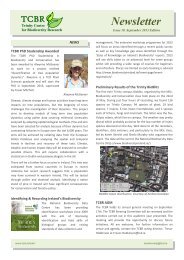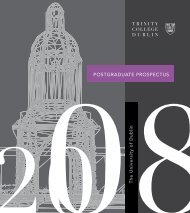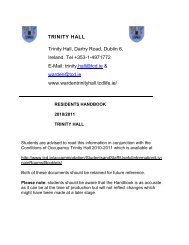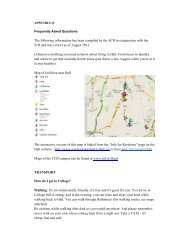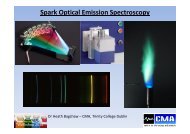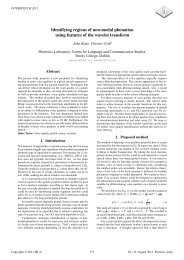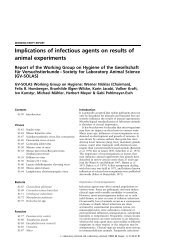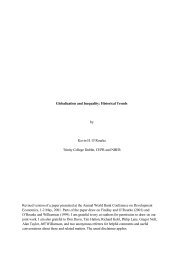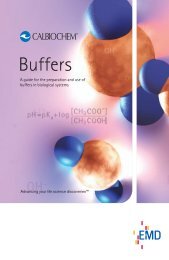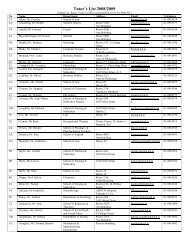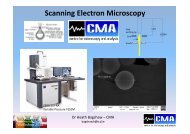Senior Freshman Programme 2013/2014 - Trinity College Dublin
Senior Freshman Programme 2013/2014 - Trinity College Dublin
Senior Freshman Programme 2013/2014 - Trinity College Dublin
You also want an ePaper? Increase the reach of your titles
YUMPU automatically turns print PDFs into web optimized ePapers that Google loves.
phenomena such as solubility and the full range of colligative properties<br />
of solutions.<br />
• Chemical Kinetics: Introduction to the principles of chemical reaction<br />
kinetics with the development of pertinent mathematical skills essential<br />
for kinetic analysis of simple chemical systems, and the application of<br />
kinetic ideas to an understanding of enzyme and heterogeneous<br />
catalysis.<br />
• Introduction to Organic Synthesis: Students are introduced to the<br />
concept of organic synthesis and the use of retrosynthetic analysis in<br />
determining ways of designing synthetic routes. This is followed by indepth<br />
discussion of the use of organometallic chemistry in carbon-carbon<br />
bond formation; the formation and elimination of alcohols, the generation<br />
of carbanions (enolates), stabilized anions and their use in C-C bond<br />
formation. The module concludes with an introduction to pericyclic<br />
reactions and the formation of double bonds using ylides. Lectures on<br />
stereochemistry and carbohydrates provide an introduction to isomers<br />
and stereochemistry, including enantiomers, diastereoisomers, chirality<br />
and asymmetric synthesis. An introduction to carbohydrate chemistry<br />
and strategies for controlling region- and stereoselectivity in<br />
glycosylation reactions is also provided.<br />
Module CH2202<br />
10 credits<br />
(Coordinator: Dr Paula Colavita: colavitp@tcd.ie)<br />
This module will cover topics in:<br />
• Main Group Chemistry: Hydrogen chemistry and hydrides; alkali and<br />
alkaline earth metals; anomalies of Li and its diagonal relationship with<br />
Mg; unique features of boron chemistry; B-Al contrast in halides;<br />
complexes of Al and Ga; inert pair effect; allotropy of carbon, chemistry<br />
of tetravalent and divalent oxidation states of Si, Ge, Sn and Pb; group-<br />
15 hydrogen compounds; halides, oxides and oxo-anions; allotropes of<br />
oxygen, compounds of S.<br />
• Nuclear and Medicinal Inorganic: Nuclear chemistry, including the<br />
different kinds of decay, kinetics, mass loss and energy, half-life, radiocarbon<br />
dating, nuclear metals in medicine (radiation therapy).<br />
Medicinal chemistry including HSAB principle, chelation therapy (Fe, Hg,<br />
Tl, Pb), and cisplatin for cancer treatment (DNA adducts, side effects,<br />
resistance).<br />
• Theoretical and Quantum Chemistry: The student will be introduced<br />
to the basic aspects of quantum mechanics and the use of Schrödinger’s<br />
equations to describe particle systems in chemistry. This topic will<br />
emphasize how the solutions to Schrodinger’s equation are connected to<br />
experimental observables and spectroscopic results, and how to use<br />
these results to obtain structural information about molecules and atoms.<br />
• Chemistry of Aromatic Compounds: This topic will consider the<br />
importance of aromatic chemistry by illustrating the number of<br />
important drugs (and some other important every-day chemicals)<br />
containing an aromatic moiety. The student will receive a brief recap on<br />
the structure of benzene, bonding, bond lengths, aromatic stabilization,<br />
and on comparison of the chemistry of alkenes to that of aromatic<br />
compounds (addition versus substitution reactions). An overview of<br />
electrophilic aromatic substitution reactions with detailed mechanistic<br />
considerations and an analysis of directing effects will be provided. The<br />
requirements for the different methods of nucleophilic aromatic<br />
18



